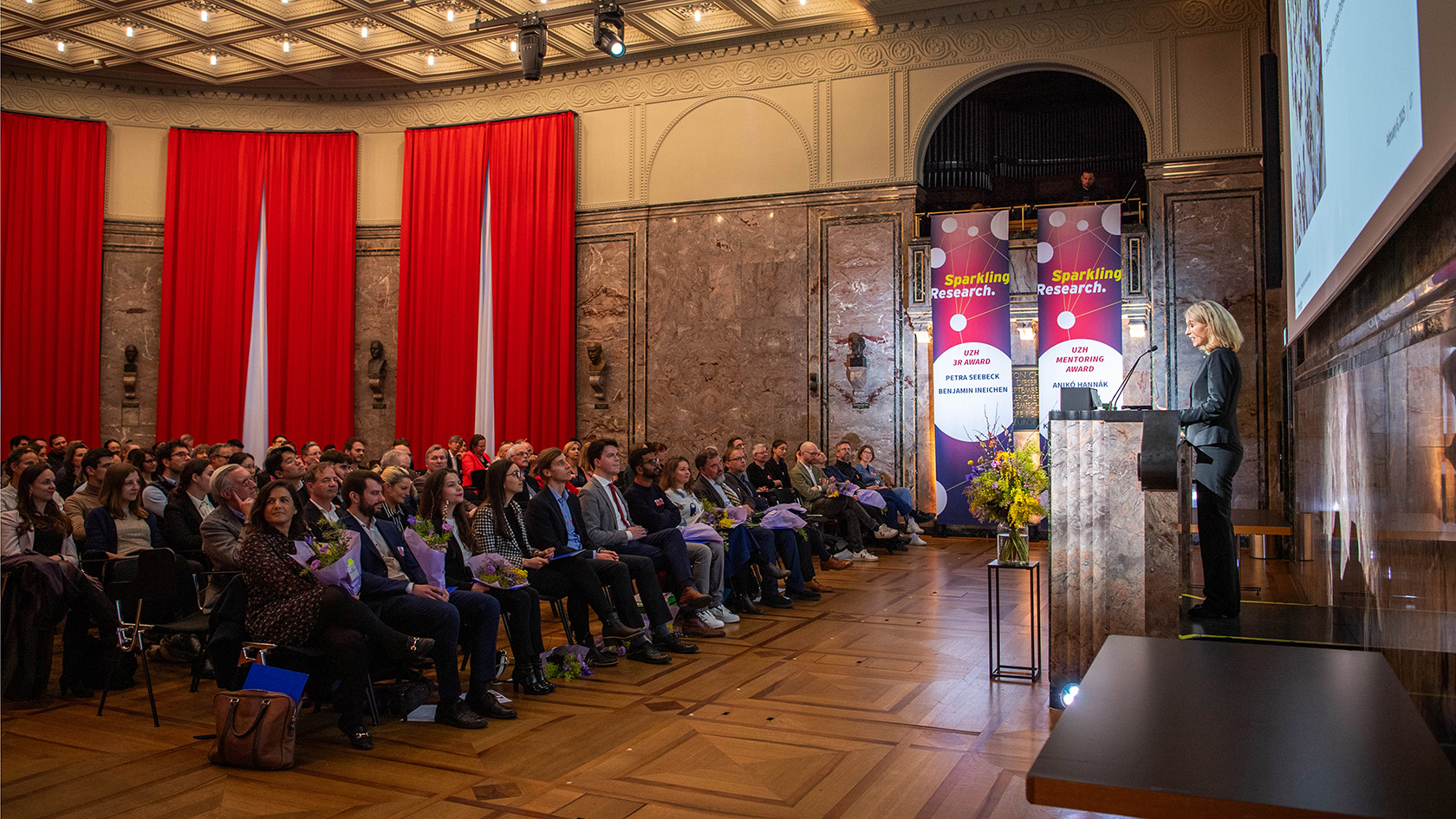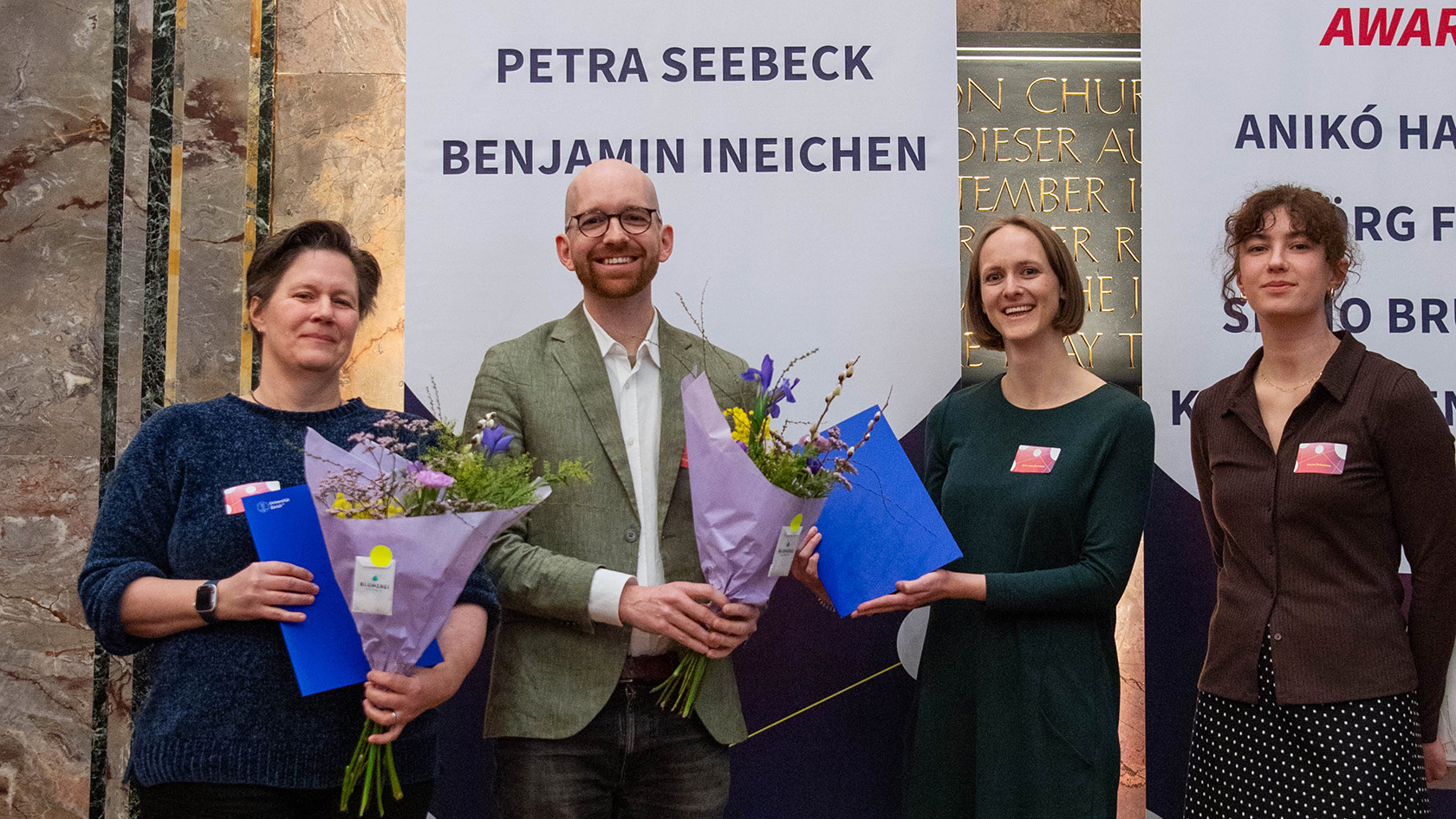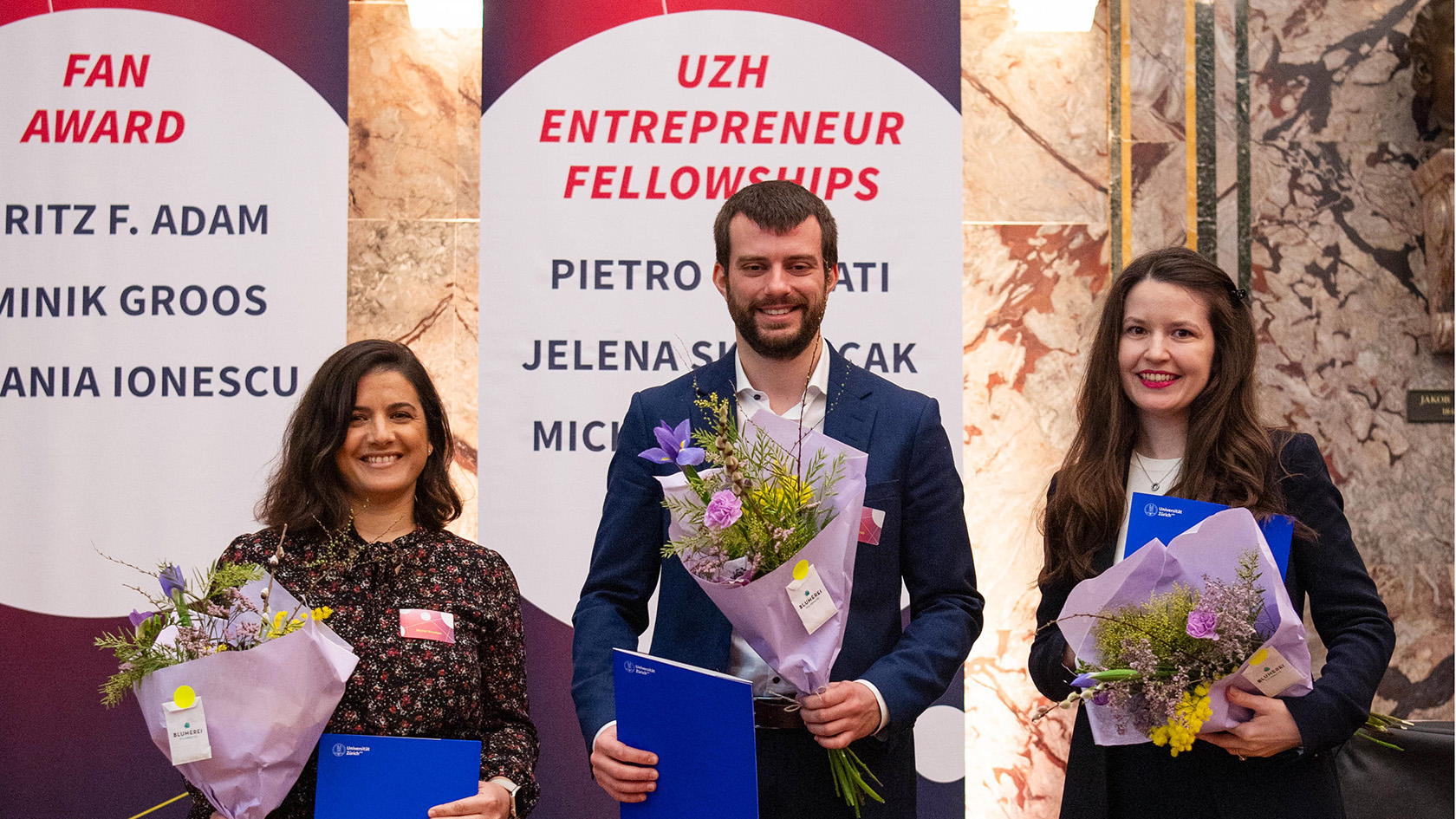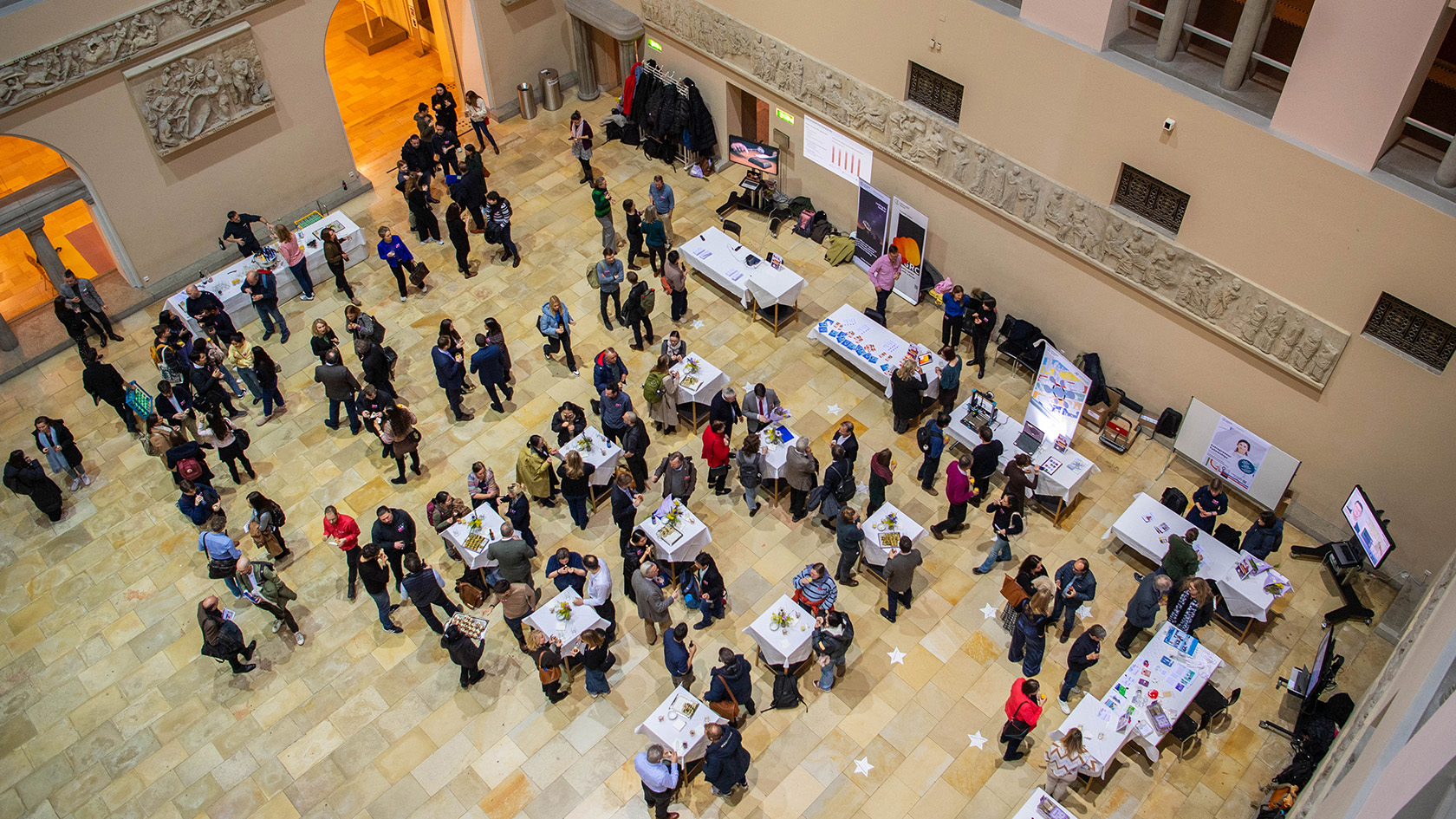“Keep a childlike curiosity”

Although cold and wet February weather prevailed outside, a festive atmosphere spread inside the lecture hall of UZH’s main building on Thursday evening last week. Elisabeth Stark, Vice President Research, welcomed researchers and numerous guests to the Sparkling Research gala. For her introduction, she highlighted UZH’s “excellent research”, which is reflected in areas such as the five ongoing University Research Priority Programs and the UZH Space Hub in Dübendorf, which managed to bring the space company Starlab Space on board at the end of last year.
“These achievements and many others are the result of our scientists’ hard work,” explained Stark, who then had the honor of introducing the recipients of the Mentoring Award, the FAN Award, the 3R Award and the fellows of the UZH Entrepreneur Fellowship Program. “Each of these awards represents outstanding research achievements and is proof of the vibrant research environment at the University of Zurich,” she said.

Each of these awards represents outstanding research achievements and is proof of the vibrant research environment at the University of Zurich.
Guest of honor: Pascal Gygax
Before proceeding with the award ceremony, Stark welcomed Pascal Gygax, a psycholinguist and psychologist from the University of Fribourg who received the prestigious Marcel Benoist Prize last year – the most significant prize in the Swiss scientific community. Gygax received his award for his work on masculinized language and how it influences our perception of the world.

A single study, a single paper is worth nothing. We depend on each other.
As the guest of honor, he delivered an impassioned plea about science as the cumulative and collaborative effort of many researchers. “A single study, a single paper is worth nothing,” he said. “We depend on each other.” Addressing the many young researchers, he explained that it’s always about questioning everything: “Keep a childlike curiosity and constantly ask questions. And work with people whom you value and who respect you.”
UZH Mentoring Awards 2025
Pascal Gygax’s remarks flowed seamlessly into the presentation of the UZH Mentoring Award, which is presented by the Graduate Campus to outstanding supervisors of doctoral students. Doctoral students are also the ones who nominate potential award recipients, who are then selected by a jury of early-career researchers from all of UZH’s seven faculties. From a longlist of 32 nominations, the following four individuals were selected for the UZH Mentoring Awards 2025:
- Prof. Silvio Brugger, Faculty of Medicine
- Professor Jörg Frey, Faculty of Theology and the Study of Religion
- Professor Anikó Hannák, Faculty of Business, Economics and Informatics
- Dr. Kannan Venugopal, Postdoc, Vetsuisse Faculty
“These four award recipients embody the highest standards in supporting and guiding early-career scientists,” remarked Vice President Stark, thanking them for their inspiring commitment.

FAN Awards 2025
The FAN Award is a distinction from the UZH Alumni’s Research Talent Development Fund awarded to early-career researchers in recognition of outstanding scientific achievements. The prize comes with an award of CHF 5,000 and is given in the fields of Law and Economics, Medicine and Natural Sciences, and Humanities and Social Sciences. Each faculty at UZH could nominate two excellent advanced PhD students or early postdocs, who were then given the opportunity to present their research to a jury. The jury selected the following three researchers for the 2025 FAN Awards:
- Dr. Moritz F. Adam, Arts and Social Sciences
- Dr. sc. nat. Dominik Groos, Medicine and Natural Sciences
- Dr. Stefania Ionescu, Law and Economics
The award recipients presented their work in brief talks. Moritz F. Adam studies concepts of time and apocalypticism in Hellenistic Judaism. Dominik Gross investigates a tiny brain region (lateral habenula) and its influence on risk-related decisions. Stefania Ionescu analyzes visibility allocation systems and their influence on society.

UZH 3R Award 2024
As Elisabeth Stark explained, she herself established this award in 2023 together with the Office for Animal Welfare and 3R. The prize recognizes outstanding contributions to the replacement, reduction and refinement of animal experiments, known as the 3R principles (replace, reduce, refine). This award therefore supports efforts by UZH staff to promote ethical research practices. Stark added that last year’s 3R award winner Giuseppe Esposito has since also received the international Humane Education and Reduction Grant from the Johns Hopkins Center for Alternatives to Animal Testing, which underscores the significance of this work in reducing animal testing in microsurgical training. The following individuals received the UZH 3R Award for 2024:
- Dr. Petra Seebeck
- PD Dr. Benjamin Ineichen
Veterinarian Petra Seebeck has developed guidelines and training courses for mouse surgery. The physician and neuroscientist Benjamin Ineichen investigates how the transferability of animal experiment results to humans can be improved. Seebeck and Ineichen have also been recognized with a national prize – the 3R Award and the Culture of Care Award 2024 – by the Swiss 3R Competence Centre. Article in UZH News

UZH Entrepreneur Fellows
The UZH Entrepreneur Fellowship Program, awarded by the Innovation Hub, is a springboard for members of the UZH community to build their own company. The program supports young scientists who want to establish a start-up based on their UZH research. It provides up to CHF 150,000 in financing along with advisory services and access to important networks so that researchers can demonstrate their product’s proof of concept and market readiness. The following three researchers successfully completed the program in 2024:
- Dr. sc. Jelena Skorucak, MedTech
- Pietro Oldrati, MedTech
- Michal Shoshan, BioTech
They delivered short reports about their work. Sleep researcher and data analyst Jelena Skorucak is developing a platform that can detect signs of epileptic disorders in children’s brain waves. The computer scientist Pietro Oldrati is working on a digital analysis device for people suffering from fatigue conditions. The chemist Michal Shoshan is developing novel protein molecules with her spin-off metaLead Therapeutics AG to filter toxic metals like lead from organs.

Impressively diverse
At the conclusion of the event, the Vice President emphasized the impressive diversity of research projects and the excellence of the individuals who received honors and accolades. Following the array of information about research and innovation, an apéro was then held in the light-filled courtyard, which was likely welcome to most participants. There they had the opportunity to delve deeper into what they had heard in personal conversations with the researchers and to discover the Office of the Vice President’s support offerings for research, innovation and early-career development.
